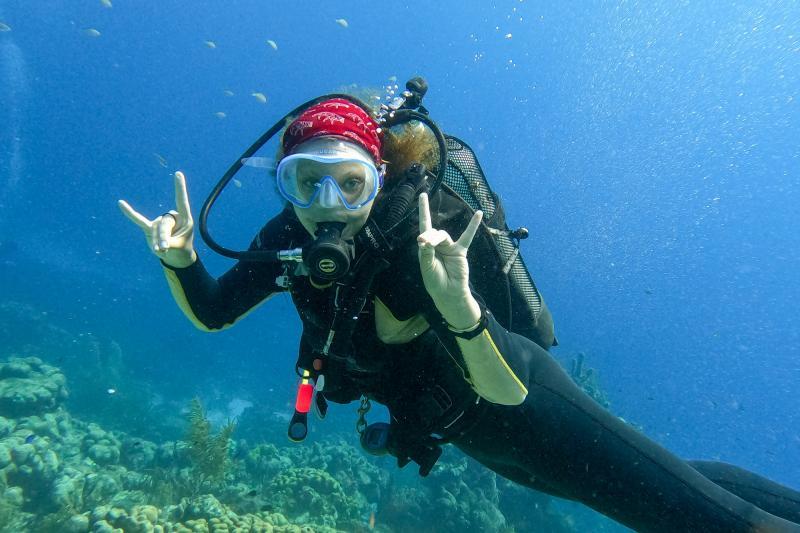
Meet Graduate student Rebecca Ruiz, who uses sound to see underwater
by NOAA Fisheries 14 Sep 2024 13:37 UTC

Rebecca Ruiz on a scientific dive in Bonaire © Rebecca Ruiz
With support from NOAA, the North Carolina Coastal Federation is funding research opportunities for undergraduate and graduate students. Graduate Student Rebecca Ruiz is investigating the ecosystem benefits of oyster restoration.
Rebecca Ruiz is a graduate student at North Carolina State University's Center for Marine Sciences and Technology. She is part of a research team investigating the benefits provided by oyster reefs restored by North Carolina Coastal Federation in the Pamlico Sound. She is learning to use novel technology and artificial intelligence to monitor which fish species use the restored oyster reefs and how reefs of different ages compare. Because the Pamlico Sound's murky waters make visual observation almost impossible, Ruiz uses sound to see. She employs hydrophones to record fish sounds and trains a computer to identify which species made the sound. She also used sonar to "see" fish on the reef in turbid water.
How did you become involved in marine science?
When I was 10, I was allowed to do a mini scuba diving event with stingrays and other fish. I thought this would be a really cool thing to do in the future.
In high school, while taking Advanced Placement environmental science, I realized that our ecosystems, the general health of our planet, and our communities were in major decline. So, I decided this would be my passion for the rest of my life and career.
As an undergraduate at Texas A&M University, Corpus Christi, I became a NOAA Center for Coastal and Marine Ecosystems scholar, which paid for a year's tuition and a stipend. Through this opportunity, I found out the North Carolina Coastal Federation was looking for incoming master's students to work on oyster reef ecology in response to restoration efforts. So I said, I'm going to jump in.
What is the purpose of your research?
We're investigating the ecological benefits of new and recently constructed reefs, characterizing the reefs' health, and developing a timescale for reef development. This will inform future conservation projects so we have a good timeline for what to expect and how we should budget our efforts moving forward. I'm comparing the difference in the soundscapes between two reefs, one built in 2021 and the other in 2023. This will help us see how quickly fish species populate the new habitat.
What do you enjoy about this work?
The most exciting part of my work is scientific diving training. As part of my grant, I received this opportunity at no personal cost. I used my training last week when I deployed sonar and hydrophone instruments at our target sites.
The other thing that's really interesting for me is machine learning. As someone with only a little coding experience, I found the opportunity to learn about advanced statistical analyses important for growing my research skills.
What do you hope to achieve through your research?
I want to grow and diversify my marketable skills so I can work for an agency like NOAA or an NGO. I want to use my hands to restore our incredibly valuable coastal ecosystems as my lifelong career.
The North Carolina Coastal Federation is preparing science students from the North Carolina State University’s Center for Marine Sciences and Technology and North Carolina Central University to take on the country’s conservation and coastal resilience challenges. NOAA’s Office of Habitat Conservation funds this initiative through the Bipartisan Infrastructure Law and Inflation Reduction Act. Additional partners include:
- North Carolina Division of Marine Fisheries
- Research Triangle Institute, International
- North Carolina Aquarium on Roanoke Island